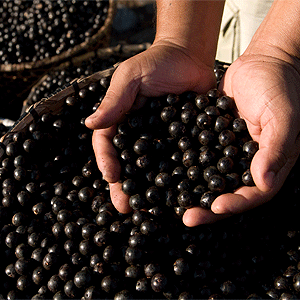
Acai berries are considered a superfood because of their exceptionally high nutritive value. We answer a few frequently asked questions about this brilliant berry from the Amazon basin.
Why did these acai berries only come into general use in the 1990s?
Although these berries have been used by traditional inhabitants of the rainforests for centuries, they grow in rather isolated areas and therefore only started attracting the attention of the outside world in the last three decades or so.
What does the plant look like?
The acai palm is a tall tree that can grow up to 25m in height. The berries grow high up on stems, and are harvested by expert tree climbers.
Does the harvesting of these berries contribute to the deforestation of the Amazon?
No, on the contrary. Greenpeace has identified acai harvesting as a sustainable commercial initiative that benefits local inhabitants and which works against the deforestation of the region.
What do these berries look and taste like?
Acai berries are purple and about the size of a grape. They taste tart, but sweet – a bit like a blackberry.
How many kilojoules do acai berries have?
They’re relatively high in kilojoules, and 100g of the berries contain between 335 and 1046 kilojoules, depending on how they’ve been prepared.
What makes them so special?
Acai berries are packed with nutrients, including antioxidants, fibre, healthy omega fatty acids, calcium, magnesium, zinc and copper, as well as vitamins A, B1, B2, B3 and E.
Do I have to eat the berries fresh?
Fresh berries are not easy to find, and mostly people take acai as an extract, as capsules, or in freeze-dried powdered form. They also come in melt-away tablets that will dissolve on the tongue.
How do I store the freeze-dried acai powder?
The powder is heat-sensitive and exposure to high temperatures can reduce its nutritional benefits. It’s recommended that you store the powder in the fridge.
Read: When herbal remedies are dangerous
How much should I take every day?
This depends on your state of health and your age. Follow the package directions carefully, but also speak to your doctor and/or dietician before adding substantial amounts of acai berries to your diet.
Where should I buy this product?
Only buy acai berry products from accredited health stores or reputable online health stores.
Can anyone take acai berries?
Acai berries are generally safe, even for children and pregnant women. However, it’s always advisable to speak to your doctor and/or dietician about any changes or additions to your diet, especially if you have any chronic medical conditions.
Read: What’s so 'super' about superfoods?
When should I take it?
It doesn’t really matter, except if the specific product you’re taking contains caffeine. You don’t want to take a stimulant just before trying to get a good night’s sleep. It’s important to check exactly what foodstuffs and medications contain before taking them. Check product labels carefully.
Will it interfere with my usual medications?
Speak to your doctor about this, as every person reacts differently to medication and certain foods. Currently, there isn’t sufficient information available on acai and its possible interaction with medication.
Is it true that acai berries can help me lose weight?
No, there isn’t sufficient evidence yet, but preliminary research has shown that eating 100mg of acai pulp twice day may reduce fasting glucose and total cholesterol levels in overweight people.
Acai berries have a low glycaemic index (GI), making them a healthy addition to your diet if you’re keen to control your blood-sugar levels better.
What are its antioxidant properties?
Acai berries are rich in flavonoids, all of which have possible cancer-fighting properties.
What are its other medicinal benefits?
Acai berries are commonly used as an energy booster and a digestive aid, which seems to be particularly useful in treating constipation. This is because of the berries’ high fibre content.
These berries are also said to help with depression and arthritis, but studies on this are still ongoing and there’s no clear evidence yet. The Amazon inhabitants also use the berries to treat parasitic infections and ulcers. Its possible anti-ageing properties are also still being investigated.
Read more:
Acai berries- nature's 'filler'
'Superfoods' everyone should eat
Buchu - South Africa's 'miracle herb'
Image: Acai berries from iStock
References:
1. Riolife.com ,
2. Health24.com ,




 Publications
Publications
 Partners
Partners










